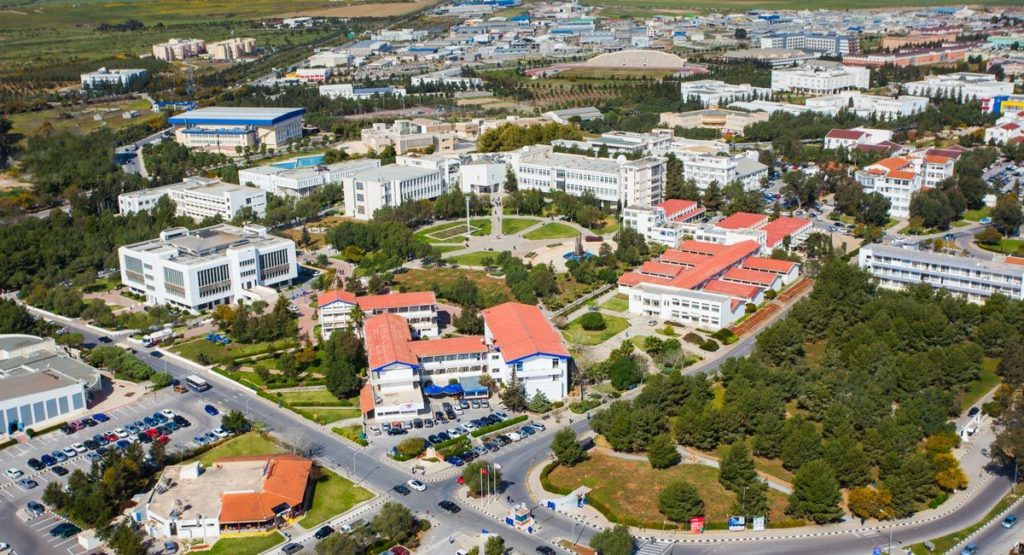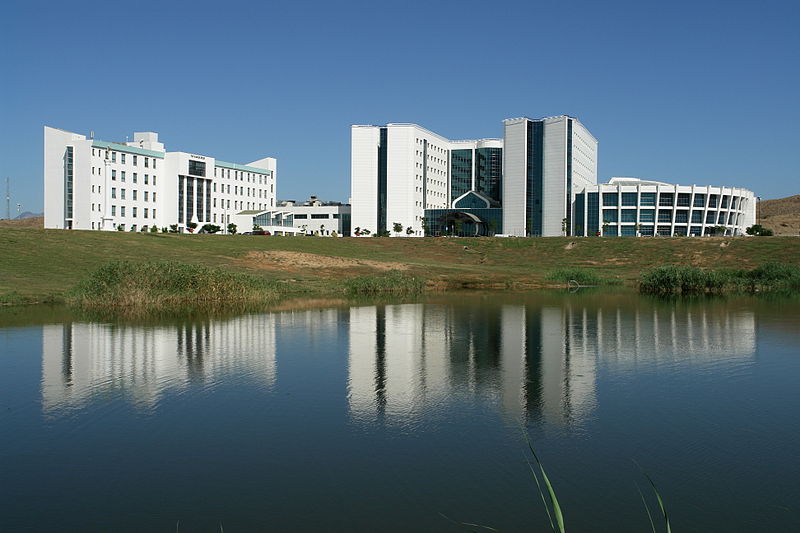Are you looking for a place to pursue your education in 2023? Do you want to experience a different culture, a warm climate, and a high-quality education system? If so, you might want to consider North Cyprus as your destination.
North Cyprus, also known as the Turkish Republic of Northern Cyprus (TRNC), has a population of about 300,000 people and it is a beautiful and peaceful place with a rich history, a diverse culture, and a friendly atmosphere.
But what about education in North Cyprus? How does it compare to other countries? What are the benefits of studying in North Cyprus? What are the requirements and procedures to apply for education in North Cyprus? And what are the best universities and programs in North Cyprus?
In this article, we will answer all these questions and more. We will provide you with the ultimate guide to education in North Cyprus for 2023. We will cover the following topics:
Table of Contents
By the end of this article, you will have a clear idea of what education in North Cyprus is like and how you can make it happen. You will also learn how Cyprusify.com can help you find the best real estate options in North Cyprus for your accommodation, investment, or retirement needs.
So, let’s get started!
Why Choose North Cyprus for Education?
There are many reasons why you might want to choose North Cyprus for your education. Here are some of the main ones:
• Quality of Education: North Cyprus offers a high-quality education system that is based on the British educational system. The curriculum, standards, and qualifications are internationally recognized and accredited. The teaching methods are modern and innovative, and the facilities are well-equipped and up-to-date. The academic staff are qualified and experienced, and many of them have degrees from prestigious universities around the world.
• Affordability: North Cyprus is one of the most affordable places to study in Europe and the Middle East. The tuition fees are much lower than in other countries, ranging from $3,000 to $8,000 per year depending on the program and university. The cost of living is also very reasonable, with an average monthly budget of $500 to $800 covering all your expenses such as accommodation, food, transportation, entertainment, and health care.
• Diversity: North Cyprus is a melting pot of cultures, languages, religions, and traditions. You will have the opportunity to meet and interact with people from different backgrounds and perspectives, which will enrich your learning experience and broaden your horizons. You will also be exposed to both Turkish and Greek cultures, as well as other influences from Europe, Asia, and Africa. You will be able to learn new languages such as Turkish, Greek, English, or Arabic, which will enhance your communication skills and career prospects.
• Culture: North Cyprus has a vibrant and colorful culture that reflects its history and heritage. You will be able to enjoy various festivals, events, concerts, exhibitions, museums, theaters, cinemas, and sports activities throughout the year. You will also be able to explore the natural beauty and historical sites of North Cyprus, such as the Kyrenia Mountains, the Karpaz Peninsula, the Salamis Ruins, the Bellapais Abbey, the St. Hilarion Castle, and many more.
• Climate: North Cyprus has a Mediterranean climate that offers warm summers and mild winters. The average temperature is 19°C (66°F), with highs of 35°C (95°F) in July and lows of 9°C (48°F) in January. The sun shines for about 300 days a year, making it ideal for outdoor activities and recreation. The sea is also warm and clear, with an average temperature of 21°C (70°F), perfect for swimming, diving, sailing, fishing, or surfing.

As you can see,
education in North Cyprus has many advantages that make it an attractive option for students who want to pursue their academic goals in a different and exciting environment.
Education System in North Cyprus
The education system in North Cyprus is organized by the Ministry of National Education and Culture. It consists of four levels: pre-school education (optional), primary education (compulsory), secondary education (compulsory), and higher education (optional).
Pre-school Education
Pre-school education is offered by public and private institutions for children below age 6. It is not mandatory but highly recommended as it prepares children for primary education. Pre-school education covers basic skills such as literacy, numeracy, socialization, and creativity.
Primary Education
Primary education provides 5 years of compulsory education for children between the ages of 6 and 11. It is free of charge in public schools and follows a national curriculum that covers subjects such as Turkish, mathematics, science, social studies, art, music, physical education, and religious education. Primary education aims to develop the cognitive, emotional, and physical abilities of students and to instill the values of democracy, human rights, and citizenship.
Secondary Education
Secondary education provides a minimum of 6 years of compulsory education for students between the ages of 12 and 18. It is divided into two stages: junior high school (Ortaokul) and high school (Lise). Junior high school lasts for 3 years and follows a common curriculum that covers subjects such as Turkish, mathematics, science, social studies, foreign language, art, music, physical education, and religious education.
High school lasts for 3 or 4 years depending on the type of school and offers different programs and tracks that cater to the interests and abilities of students. There are various types of high schools in North Cyprus, such as standard public high schools, private high schools, science high schools, vocational high schools, technical high schools, and fine arts high schoolshttps://bing.com/search?q=education+in+north+cyprus. High school students have to take a national exam at the end of their studies to obtain their diploma and to qualify for higher education.
Higher Education
Higher education is offered by public and private universities that are supervised by the Higher Education Planning, Evaluation, Accreditation and Coordination Council (YÖDAK). Higher education consists of undergraduate programs (4 or 5 years), graduate programs (master’s or doctoral degrees), and vocational programs (2 or 3 years). Higher education programs are graded based on the European Credit Transfer and Accumulation System (ECTS), which facilitates the recognition and transfer of credits among universities in Europe and beyond. Higher education programs cover a wide range of disciplines and fields such as engineering, medicine, law, business, education, arts, humanities, social sciences, natural sciences, and applied sciences.
Universities in North Cyprus
North Cyprus has 19 universities that offer quality education at affordable prices. These universities have modern campuses, facilities, and equipment that provide a conducive learning environment for students. They also have qualified and experienced academic staff who deliver innovative and relevant curricula that meet the needs of the local and global markets. They also have international partnerships and collaborations with other universities and organizations that enhance their academic reputation and quality.
Some of the best universities in North Cyprus are:
• Eastern Mediterranean University (EMU): EMU is the oldest and largest university in North Cyprus. It was established in 1979 as an extension of the Middle East Technical University in Ankara. It is a public university that offers more than 200 programs at undergraduate, graduate, and doctoral levels. It has more than 20 faculties, schools, institutes, and centers that cover various disciplines such as engineering, architecture, medicine, business administration, education, arts and sciences, communication and media studies, health sciences, tourism and hospitality management, and dentistry. It has more than 20,000 students from 106 countries and more than 1,000 academic staff from 35 countries. It is accredited by various national and international agencies such as YÖDAK, YÖK, ABET, AACSB, EDEXCEL, TEDQUAL, and FIBAA. It is ranked among the top 1000 universities in the world by the Times Higher Education World University Rankings.

• Near East University (NEU): NEU is a private university that was founded in 1988. It is one of the largest and most prestigious universities in North Cyprus. It offers more than 220 programs at undergraduate, graduate, and doctoral levels. It has 19 faculties, 4 graduate schools, 4 vocational schools, 28 research centers, and a hospital that cover various disciplines such as engineering, medicine, pharmacy, veterinary medicine, law, economics and administrative sciences, education, arts and sciences, communication, architecture, fine arts and design, health sciences, theology, music and performing arts, sports sciences, dentistry, maritime studies, and aviation. It has more than 25,000 students from 110 countries and more than 1,500 academic staff from 23 countries. It is accredited by various national and international agencies such as YÖDAK, YÖK, ASIIN, EDEXCEL, EQAR, and FIBAA. It is ranked among the top 1000 universities in the world by the Times Higher Education World University Rankings.

• Cyprus International University (CIU): CIU is a private university that was established in 1997. It is one of the fastest-growing and most innovative universities in North Cyprus. It offers more than 120 programs at undergraduate, graduate, and doctoral levels. It has 12 faculties, 5 schools, 3 vocational schools, and 11 research centers that cover various disciplines such as engineering, medicine, pharmacy, law, economics and administrative sciences, education, arts and sciences, communication and media studies, architecture and design, health sciences, tourism and hotel management, and agriculture. It has more than 18,000 students from 109 countries and more than 800 academic staff from 35 countries. It is accredited by various national and international agencies such as YÖDAK, YÖK, ASIIN, EDEXCEL, PEARSON, and FIBAA. It is ranked among the top 2000 universities in the world by the Times Higher Education World University Rankings.
These are just some of the examples of the universities in North Cyprus that offer quality education at affordable prices. You can find more information about these and other universities on their websites or on the YÖDAK website.
How to Apply for Education in North Cyprus
If you are interested in applying for education in North Cyprus, you need to follow some steps and procedures to ensure a smooth and successful application process. Here are the main steps you need to take:
• Choose your program and university: The first step is to choose the program and university that suit your interests, abilities, and goals. You can use various sources to research and compare different programs and universities, such as their websites, brochures, catalogs, rankings, reviews, or alumni testimonials. You can also contact the admission offices or representatives of the universities for more information and guidance.
• Check the admission requirements: The second step is to check the admission requirements for your chosen program and university. The admission requirements may vary depending on the level, type, and field of study, as well as the university. However, some of the common requirements are:
- A high school diploma or equivalent qualification with a minimum grade point average (GPA) or percentage
- A proof of English language proficiency, such as TOEFL, IELTS, or PTE scores
- A proof of Turkish language proficiency, if applicable
- A letter of motivation or statement of purpose
- A curriculum vitae (CV) or resume
- Letters of recommendation
- Transcripts of previous academic records
- A passport or identity card
- A passport-sized photo
- An application fee
• Submit your application: The third step is to submit your application to your chosen program and university. You can apply online through the university’s website or offline by sending your application documents by mail or courier. You need to fill out an application form and attach all the required documents. You also need to pay an application fee, which is usually non-refundable. You should apply as early as possible to avoid missing the deadlines and to increase your chances of acceptance.
• Receive your acceptance letter: The fourth step is to receive your acceptance letter from your chosen program and university. The acceptance letter is an official document that confirms your admission and provides you with important information such as your student number, registration date, tuition fee, scholarship (if any), and visa instructions. You should keep this letter safe and print a copy for future reference.
• Apply for a visa: The fifth step is to apply for a visa to enter and study in North Cyprus. You need to apply for a student visa at the nearest Turkish embassy or consulate in your country. You need to submit your acceptance letter, passport, passport-sized photo, bank statement, health insurance, and visa fee along with your visa application form. You should apply for a visa at least one month before your intended travel date to avoid any delays or complications.
• Arrive and register: The final step is to arrive and register at your chosen program and university. You need to book your flight ticket and arrange your accommodation in advance. You also need to bring all your original documents with you, such as your acceptance letter, passport, visa, transcripts, diplomas, language certificates, etc. You need to report to the international office or student affairs office of your university upon arrival and complete your registration process. You also need to pay your tuition fee (or first installment) and receive your student ID card.
These are the main steps you need to take to apply for education in North Cyprus. However, you may also need to follow some additional steps or procedures depending on your specific situation or circumstances. Therefore, you should always check with your chosen program and university for more details and instructions.
Living and Studying in North Cyprus
Living and studying in North Cyprus can be an enjoyable and rewarding experience if you are well-prepared and well-informed. Here are some tips and advice on how to live and study in North Cyprus:
• Find accommodation: One of the first things you need to do when you arrive in North Cyprus is to find accommodation. You have two main options: staying on campus or off campus. Staying on campus means living in a dormitory or a residence hall provided by your university. This option is convenient, safe, and affordable, but it may also have some limitations such as space, privacy, rules, or availability. Staying off campus means renting an apartment or a house outside the university premises. This option is more flexible, spacious, and comfortable, but it may also be more expensive, risky, and challenging. You need to find a reliable landlord, sign a contract, pay a deposit, and deal with utilities, maintenance, and transportation. You can find accommodation options online, through your university, or through local agents or friends. You should always inspect the accommodation before you rent it and make sure it meets your needs and expectations.
• Manage your budget: Another important thing you need to do when you live and study in North Cyprus is to manage your budget. You need to plan your income and expenses carefully and realistically. You need to consider the following costs:
• Tuition fee: This is the amount you need to pay for your education program. It varies depending on the program and university, but it is usually lower than in other countries. You may also be eligible for scholarships, grants, or loans that can reduce or cover your tuition fee.
• Accommodation fee: This is the amount you need to pay for your accommodation. It depends on the type, location, and quality of your accommodation, but it is usually cheaper than in other countries. You may also be able to share your accommodation with other students.
• Living expenses: These are the costs of your daily needs such as food, transportation, health care, entertainment, and personal items. They vary depending on your lifestyle and preferences, but they are generally affordable in North Cyprus. You can save money by cooking at home, using public transportation, buying local products, and taking advantage of student discounts.
• Travel expenses: These are the costs of your travel to and from North Cyprus, as well as within North Cyprus or to other countries. They depend on the mode, frequency, and distance of your travel, as well as the season and availability of tickets. You can save money by booking in advance, comparing prices, using low-cost airlines or buses, and traveling during off-peak periods.
You should keep track of your income and expenses regularly and adjust your budget accordingly. You should also have some savings or emergency funds in case of unexpected situations or opportunities.
• Learn the language: Learning the language of the country where you study is not only beneficial for your academic success but also for your social and cultural integration. The official languages of North Cyprus are Turkish and English. Turkish is the native language of most of the population and is used in most public and private sectors. English is widely spoken and understood by many people, especially in the education sector. Therefore, you should learn both languages if you want to communicate effectively and enjoy your stay in North Cyprus.
You can learn Turkish and English in various ways, such as taking courses at your university or other institutions, using online platforms or apps, reading books or newspapers, watching movies or shows, listening to music or podcasts, or practicing with native speakers or other learners. You should aim to improve your listening, speaking, reading, and writing skills in both languages and use them as much as possible in different situations.
• Respect the culture: Respecting the culture of the country where you study is essential for your personal and professional development as well as for your relationship with the local people. The culture of North Cyprus is influenced by both Turkish and Greek cultures, as well as other cultures from Europe, Asia, and Africa. It is a rich and diverse culture that values hospitality, family, friendship, religion.
• Religion, tradition, and etiquette: Religion is an important aspect of the culture of North Cyprus. The majority of the population are Muslims, who follow the Sunni branch of Islam. There are also small minorities of Christians, Jews, Baha’is, and atheists. Religion influences many aspects of life in North Cyprus, such as holidays, festivals, ceremonies, dress codes, food, and social norms. You should respect the religious beliefs and practices of the people and avoid any offensive or insensitive remarks or actions. You should also be aware of some of the traditions and etiquette rules that are common in North Cyprus, such as:
• Greeting: When you meet someone for the first time or after a long time, you should shake hands and say “Merhaba” (Hello) or “Selam” (Peace). You may also kiss both cheeks or hug if you are close friends or relatives. You should always greet elders first and use formal titles such as “Bey” (Mr.), “Hanım” (Mrs.), “Hoca” (Teacher), or “Doktor” (Doctor) unless you are invited to use their first names.
• Visiting: When you visit someone’s home, you should always call or message in advance and confirm the time and date. You should also bring a small gift such as flowers, chocolates, or sweets. You should take off your shoes at the entrance and wear slippers provided by the host. You should compliment the host on their home and accept any food or drink they offer you. You should not refuse or criticize anything they serve you. You should also avoid topics such as politics, religion, or personal matters unless they initiate them.
• Eating: When you eat with someone, you should wait for them to invite you to start or to say “Afiyet olsun” (Enjoy your meal). You should use your right hand to eat and drink and avoid using your left hand as it is considered rude. You should not talk with your mouth full or make loud noises while eating. You should try to finish everything on your plate and not waste any food. You should also offer to help with the dishes or cleaning after the meal.
• Dressing: When you dress in North Cyprus, you should consider the weather, the occasion, and the location. You should wear light and comfortable clothes in summer and warm and cozy clothes in winter. You should wear formal and conservative clothes for official or religious events and casual and trendy clothes for social or leisure activities. You should avoid wearing revealing or provocative clothes in public places such as mosques, schools, government offices, or markets.
These are some of the tips and advice on how to respect the culture of North Cyprus. However, you should also be open-minded and curious about learning more about the culture and customs of the people. You should ask questions politely and listen attentively when someone explains something to you. You should also participate in cultural activities and events that will help you understand and appreciate the culture better.
Conclusion
In conclusion, education in North Cyprus is a great opportunity for students who want to pursue their academic goals in a different and exciting environment. North Cyprus offers a high-quality education system that is based on the British educational system and is internationally recognized and accredited. North Cyprus also offers a low-cost education that is affordable for most students. North Cyprus also offers a diverse culture that is influenced by both Turkish and Greek cultures, as well as other cultures from Europe, Asia, and Africa. North Cyprus also offers a warm climate that is ideal for outdoor activities and recreation.
If you are interested in applying for education in North Cyprus, you need to follow some steps and procedures to ensure a smooth and successful application process. You need to choose your program and university, check the admission requirements, submit your application, receive your acceptance letter, apply for a visa, arrive and register.
Studying and living in North Cyprus can be an enjoyable and rewarding experience if you are well-prepared and well-informed. You need to find accommodation, manage your budget, learn the language, respect the culture, and enjoy your stay.
We hope that this article has given you a clear and comprehensive guide to education in North Cyprus for 2023. We also hope that you are interested and excited to apply for education in North Cyprus and to experience its benefits and opportunities.
If you have any questions or concerns about education in North Cyprus, you can contact the admission offices or representatives of the universities that you are interested in. You can also visit the YÖDAK website for more information and guidance.
If you are looking for real estate options in North Cyprus, you can contact Cyprusify.com, the leading real estate website in North Cyprus. Cyprusify.com can help you find the best properties for your accommodation, investment, or retirement needs. You can browse through hundreds of listings, compare prices and features in North Cyprus properties for sale section. You can also get expert advice and support from their team of professionals who have years of experience and knowledge in the real estate market in North Cyprus.
Thank you for reading this article and we wish you all the best in your education journey in North Cyprus. Afiyet olsun!


0 Comments